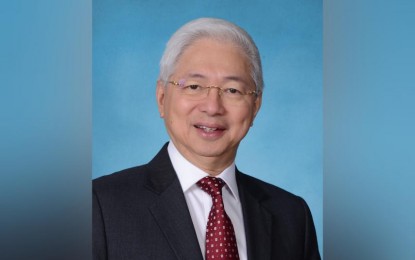[1.7] PBBM 중국 방문, 더 많은 일자리 창출, 외환 수익 증대: DTI
컨텐츠 정보
- 21,518 조회
본문
MANILA -- 통상산업부(DTI)의 "Alfredo Pascual" 장관은 금요일 필리핀에 더 많은 중국 투자자가 들어오면 필리핀 사람들에게 더 많은 일자리가 생기고 외환 수입이 증가하며 농업 생산 비용이 낮아질 것이라고 말했습니다.
1월 3~5일 대통령의 중국 국빈 방문 기간 베이징에서 열린 중국 최고경영자(CEO)들과의 회동에서 '페르디난드 R. 마르코스 주니어' 대통령과 동행한 '파스쿠알'은 중국 기업의 큰 관심을 받고 있다고 말했다. 소유자 및 투자자가 필리핀에 투자하거나 여기에서 사업을 확장합니다.
앞서 '마르코스'는 농업, 재생에너지, 광물가공, 전기자동차 등 다양한 분야의 CEO들과 원탁회의를 가졌다.
Pascual은 "필리핀 사람들에게 즉각적인 영향은 일자리가 될 것입니다. 왜냐하면 수입업자들은 필리핀에서 생산된 제품을 구매하게 될 것이기 때문입니다. 그리고 그것을 생산하는 (현지) 회사들은 생산량을 늘리거나 늘려야 할 것입니다."라고 "Pascual"은 말했습니다. 인터뷰.
"그것은 필리핀에서 추가 고용을 의미하고 새로운 투자는 또한 필리핀에서 새로운 일자리 창출로 이어집니다."라고 무역 책임자는 덧붙였습니다.
필리핀의 외환 수입은 또한 농산물 수출 증가로 인해 이익을 얻을 것이라고 "Pascual"은 투자가 필리핀으로의 송금을 의미할 것이라고 지적했습니다.
공급 측면에서 또 다른 이점은 농업 생산 비용이 감소할 것이라고 그는 말했습니다.
"Pascual"은 중국이 필리핀의 가장 큰 무역 파트너이기 때문에 필리핀이 대외 무역 협정 양보 또는 관세 관련 특혜를 받을 수 있다고 언급했습니다.
“그래서 필리핀과 중국 사이에 양방향 시장이 열렸습니다. 그러나 결국 우리는 매우 구체적인 제품에 초점을 맞추기 위해 중국과 대외 무역 협정을 직접 협상해야 할 것입니다. 이를 위해 우리는 중국 시장에 대한 더 많은 접근을 원하고 중국인들은 필리핀 시장에 더 많은 접근을 할 것입니다.”라고 Pascual은 지적했습니다. 밖으로.
무역장관은 역내포괄적경제동반자협정(RCEP)도 필리핀이 그렇게 하는 데 도움이 될 것이지만 주로 제품 제조에서 그러할 것이라고 말했습니다.
RCEP는 동남아시아국가연합(ASEAN)의 10개 회원국과 호주, 중국, 일본, 뉴질랜드, 대한민국의 5개 FTA 파트너 간의 자유 무역 협정(FTA)입니다. (PNA)
This is the original Article from PNA NEWS
[1.7] PBBM China visit to create more jobs, boost forex earnings: DTI
MANILA -- Department of Trade and Industry (DTI) Secretary "Alfredo Pascual" on Friday said the coming in of more Chinese investors to the Philippines would translate into more jobs for Filipinos, enhanced foreign exchange earnings and lower cost of agricultural output.
"Pascual," who accompanied President "Ferdinand R. Marcos Jr.," during his meetings with Chinese chief executive officers (CEOs) in Beijing during the President’s state visit to China on January 3-5, said there is huge interest from Chinese business owners and investors to invest in the Philippines or expand their operations here.
"Marcos," earlier had roundtable meetings with CEOs from various sectors such as agriculture, renewable energy, mineral processing and e-vehicles.
“The immediate impact for Filipinos will be jobs because the importers would be buying products that are produced in the Philippines, and the (local) companies that are producing them will have to rev up or increase their production,” "Pascual," said in an interview.
“That means additional employment in the Philippines, and new investments also result in creation of new jobs in the Philippines," the trade chief added.
The country’s foreign exchange earnings will also benefit from the increase in the export of agricultural products, "Pascual," said, pointing out that investments would mean remittances to the Philippines.
On the supply side, another benefit would be reduced cost of agricultural output, he said.
"Pascual," noted that because China is the Philippines' biggest trading partner, the country can avail of foreign trade agreement concessions, or preferential treatment with respect to tariffs.
“So that opens up the market both ways between the Philippines and China. But eventually, we’ll have to negotiate [a] direct foreign trade agreement with China to focus on very specific products… for which we want greater access to the Chinese market and the Chinese will have greater access to the Philippine market,” Pascual pointed out.
The Regional Comprehensive Economic Partnership (RCEP), the trade secretary said, will also help the Philippines do that, but mainly in the manufacturing of products.
RCEP is a free trade agreement (FTA) between the 10 member states of the Association of Southeast Asian Nations (ASEAN) and its five FTA partners: Australia, China, Japan, New Zealand and the Republic of Korea. (PNA)
관련자료
-
이전
-
다음


